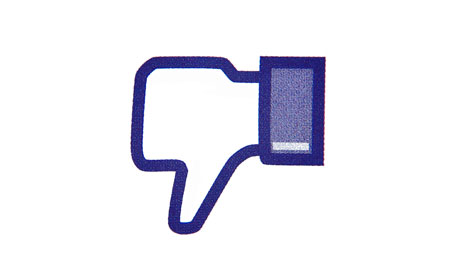‘In spite of complaint after complaint, Facebook continues to deem content encouraging violence against women inoffensive.’
Image: dpa picture alliance/Alamy
A few weeks ago I wrote about
Facebook and the perpetuation of rape culture. At the time, The Everyday Sexism Project had mobilized Twitter users to contact Facebook and its advertisers about properly moderating and removing the misogynistic pages found throughout the social networking site. There was a lot of buzz on Twitter and some media coverage (as outlined in the previous post), at least
one advertiser pulled their ads, and slowly things started to die off.
Until now.
The outrage didn’t go away, as I’m sure both Facebook and advertisers fervently hoped. Instead, the outraged regrouped and wrote an
open letter to Facebook, originally signed by approximately 40 organizations from around the world. Within 48 hours, that number was nearly 70; in less than a week, nearly 100. The letter, written by Laura Bates of The Everyday Sexism Project, writer and activist
Soraya Chemaly, and Jaclyn Friedman of
Women, Action & the Media (WAM!), asks Facebook for “swift, comprehensive and effective action addressing the representation of rape and domestic violence.” It goes on to say that they will be “calling on Facebook users to contact advertisers whose ads on Facebook appear next to content that targets women for violence, to ask these companies to withdraw from advertising on Facebook” until gender-based hate speech is banned from Facebook.
Specifically, the letter asks for Facebook for three things:
1. Recognize speech that trivializes or glorifies violence against girls and women as hate speech and make a commitment that you will not tolerate this content.
2. Effectively train moderators to recognize and remove gender-based hate speech.
3. Effectively train moderators to understand how online harassment differently affects women and men, in part due to the real-world pandemic of violence against women.
Because Facebook hasn’t really responded to the campaign‚Äìthey do respond to specific complaints with
form letters‚Äìand often doesn’t even remove pages that have garnered hundreds of complaints (unless the
media publicizes the offensive pages), users have begun to target the advertisers who appear alongside pages that promote misogyny, rape, and violence against women. After taking a screenshot of the offending image/page and the advertisers shown to that user, the image is sent to the advertiser’s Twitter account, accompanied by the hashtag #FBRape and a message asking if they’re ok with their product being shown on that page.
Most advertisers have the same initial response: that they don’t control where their ads appear and Facebook ads target the user, not the page. When pushed, some of the advertisers say they’ll look into it, others repeat the argument that they don’t have control, and some refuse to respond at all. A few, however,¬†have
pulled their advertising dollars from Facebook, because they are truly horrified by what they see.
The problem is that advertisers do have control. They may not be able to control specifically where their ads appear, but they don’t have to advertise with Facebook at all. If a magazine or newspaper published articles celebrating images similar to the ones on Facebook, advertisers would move their money elsewhere, and the same has happened with radio shows. Advertisers need to understand that they are complicit when they advertise alongside images like these (trigger warning: many of these images are graphic and horrifying), and if asking them to reconsider their spending won’t work, then consumers need to spend their money elsewhere.
From The Everyday Sexism Project
There are a myriad of problems with these pages, but at the most basic level, anything that glorifies rape and violence against women or treats the subject as humorous normalizes the idea that it’s ok. By showing women as objects, sexual or otherwise, they are dehumanized, and suddenly the violence is acceptable, because it’s not really hurting anyone. And by normalizing these reactions in society as a whole, children see it as acceptable behaviour. Boys who make lewd comments to women don’t know or care that it’s wrong, and girls grow up thinking that it’s either normal for adult men to leer at them, or even worse, that it’s their fault that they’re being leered at. Facebook is certainly not the only problem, but as a huge part of modern society, they should understand the effect they have on it.
From The Everyday Sexism Project
-Katie Weidmann
Junior Girl
Girl Museum Inc.
UPDATE: There
have been reports on Twitter of Facebook no longer responding to reports, as well as removing the ability to track the status of reports.
UPDATE:
Facebook has conceded to update their policies in response to the #FBRape campaign. More than 100 advocacy groups protested their policies, and 15
advertisers pulled their ads.





